高二英语情态动词复习课件
图片预览
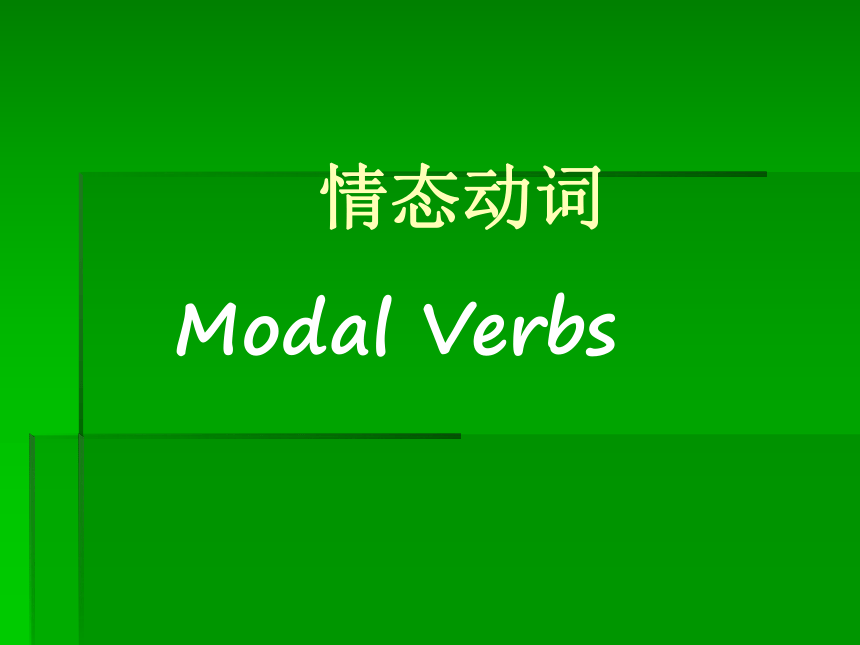
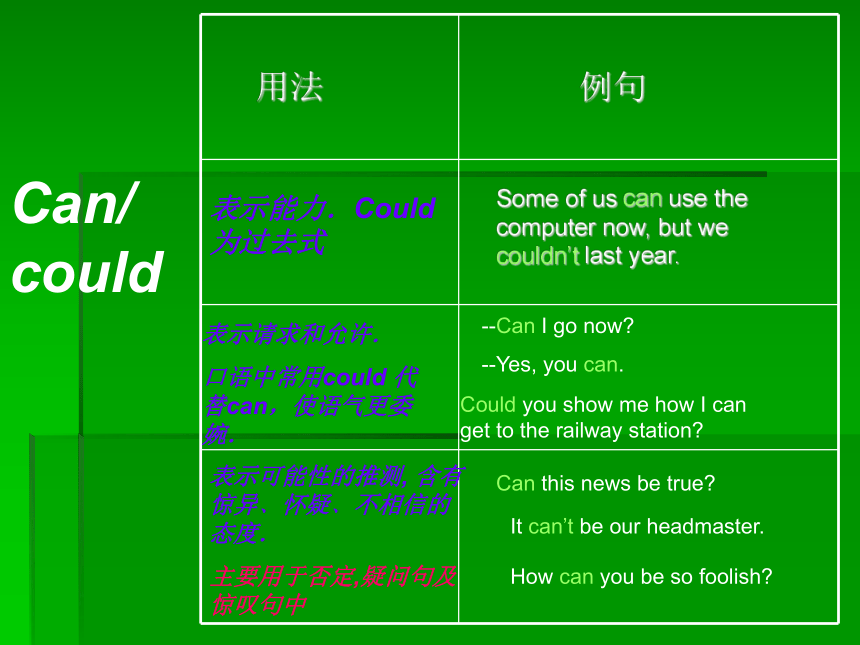
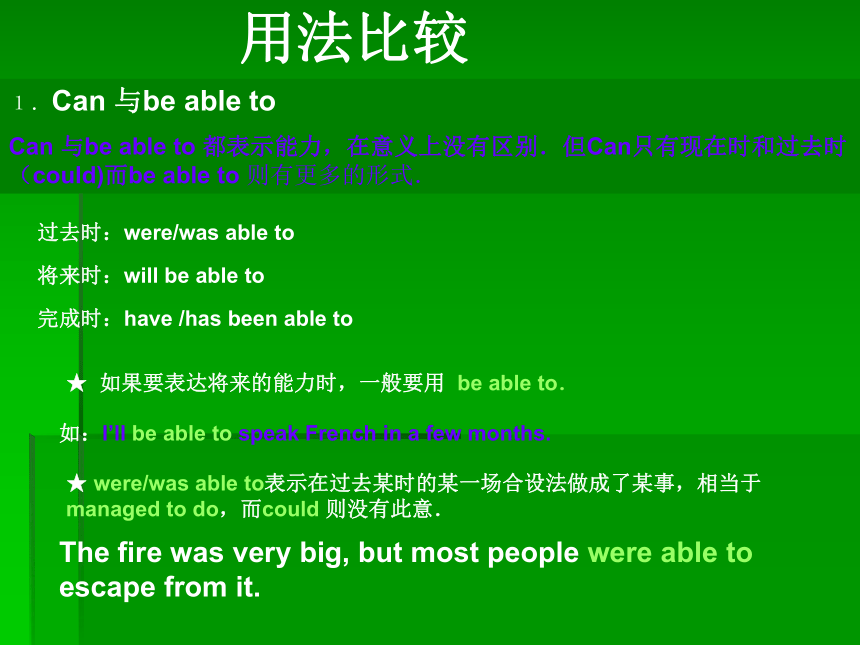
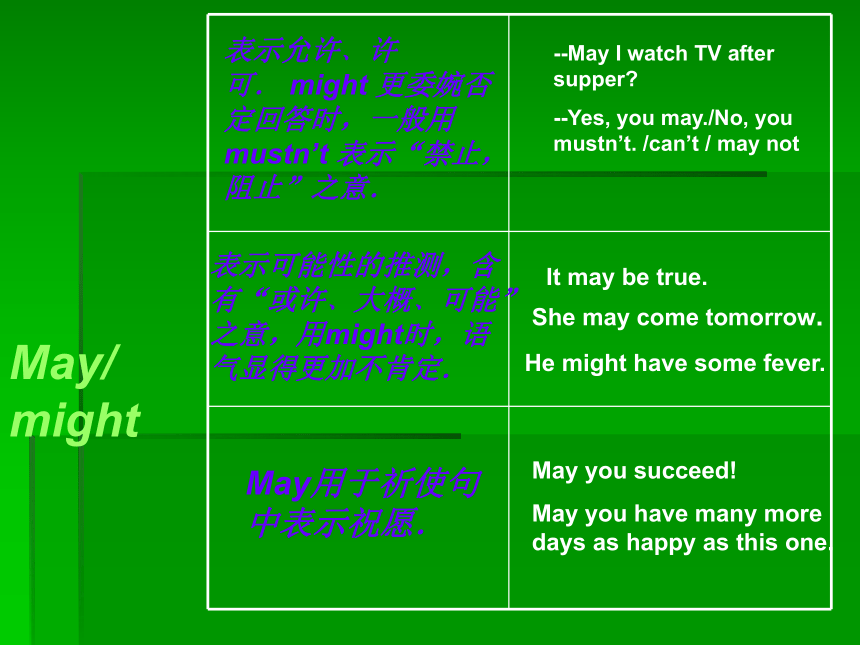
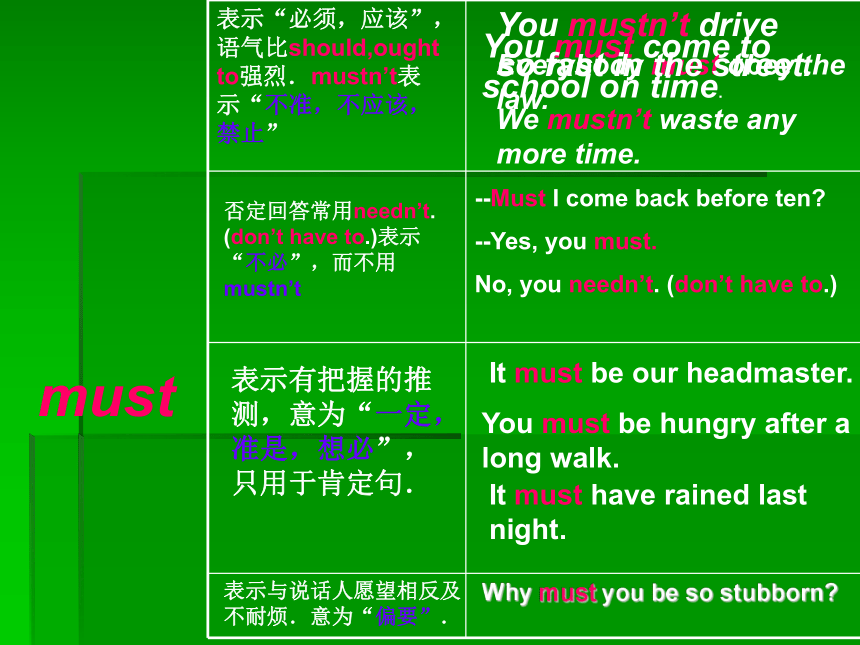
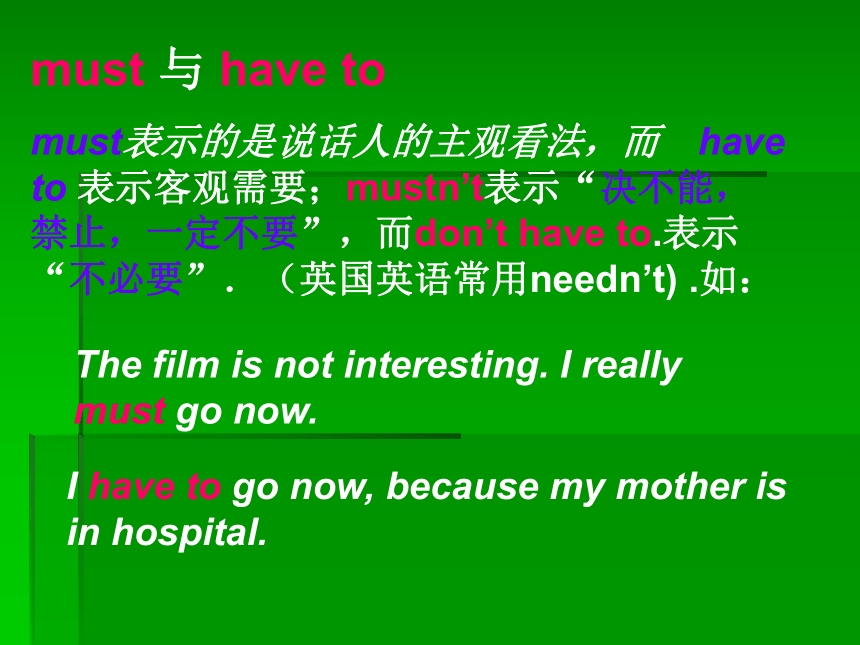

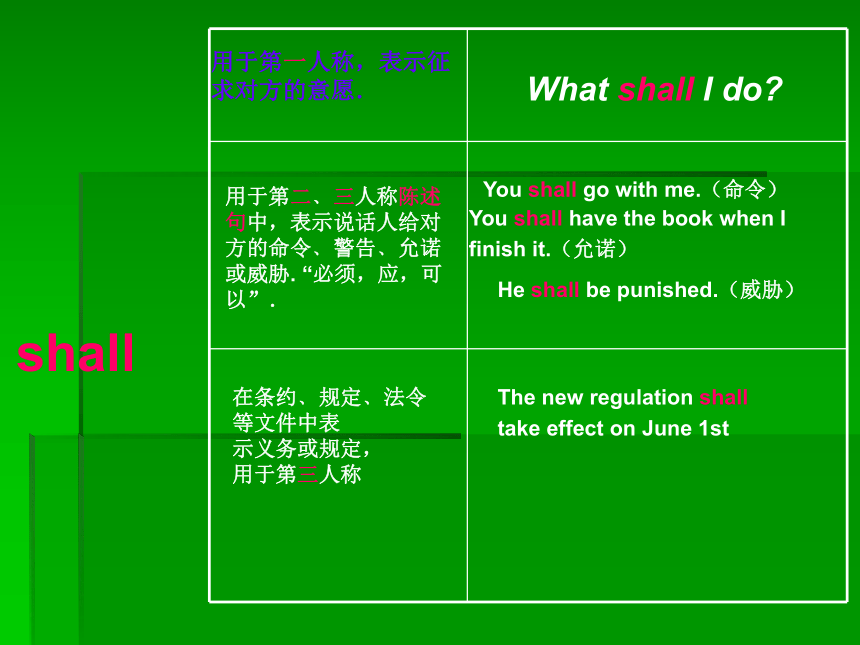
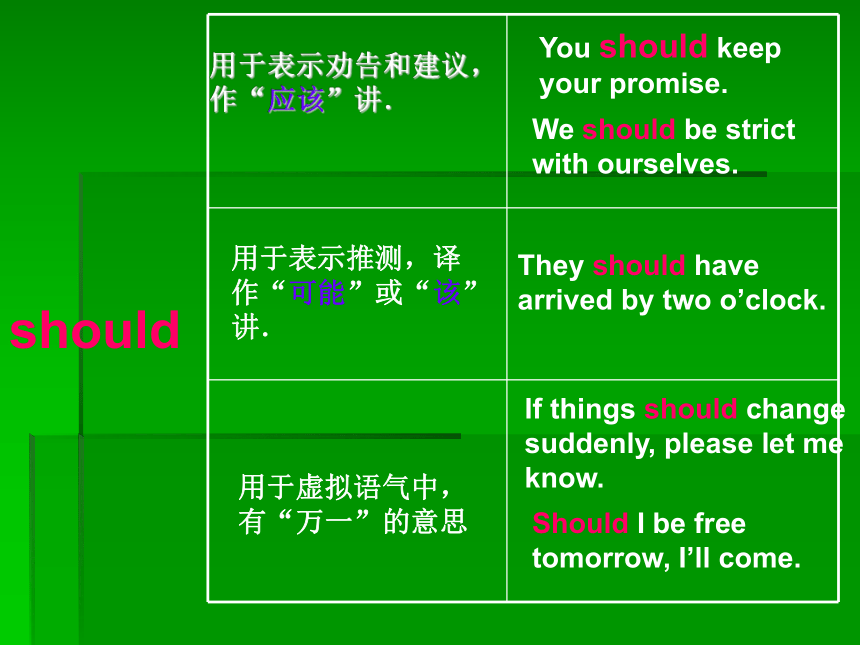
文档简介
课件24张PPT。 情态动词
Modal VerbsCan/could表示能力.Could 为过去式Some of us can use the computer now, but we couldn’t last year.
表示请求和允许.
口语中常用could 代替can,使语气更委婉.--Can I go now?
--Yes, you can.
Could you show me how I can get to the railway station?表示可能性的推测, 含有惊异﹑怀疑﹑不相信的态度.
主要用于否定,疑问句及惊叹句中Can this news be true?It can’t be our headmaster.How can you be so foolish? 用法比较1.Can 与be able to
Can 与be able to 都表示能力,在意义上没有区别.但Can只有现在时和过去时(could)而be able to 则有更多的形式.过去时:were/was able to将来时:will be able to完成时:have /has been able to★ 如果要表达将来的能力时,一般要用 be able to.如:I’ll be able to speak French in a few months.★ were/was able to表示在过去某时的某一场合设法做成了某事,相当于managed to do,而could 则没有此意.The fire was very big, but most people were able to escape from it.May/ might表示允许﹑许可. might 更委婉否定回答时,一般用mustn’t 表示“禁止,阻止”之意.--May I watch TV after supper?
--Yes, you may./No, you mustn’t. /can’t / may not表示可能性的推测,含有“或许﹑大概﹑可能”之意,用might时,语气显得更加不肯定.It may be true.She may come tomorrow.He might have some fever.May用于祈使句中表示祝愿.May you succeed!
May you have many more days as happy as this one.mustYou must come to school on time.Everybody must obey the law.You mustn’t drive so fast in the street.
We mustn’t waste any more time.表示“必须,应该”,语气比should,ought to强烈.mustn’t表示“不准,不应该,禁止”--Must I come back before ten?
--Yes, you must.
No, you needn’t. (don’t have to.)否定回答常用needn’t. (don’t have to.)表示“不必”,而不用mustn’tIt must be our headmaster.You must be hungry after a long walk.It must have rained last night.表示有把握的推测,意为“一定,准是,想必”,只用于肯定句.Why must you be so stubborn?表示与说话人愿望相反及不耐烦.意为“偏要”.must 与 have tomust表示的是说话人的主观看法,而 have to 表示客观需要;mustn’t表示“决不能,禁止,一定不要”,而don’t have to.表示“不必要”.(英国英语常用needn’t) .如:
The film is not interesting. I really must go now. I have to go now, because my mother is in hospital.
can, may, must 在表示推测意义时的用法can, may, must 在表示推测意义时必须用在规定的句式中:
句式肯定句否定句疑问句canmaymustCan’t不可能may not可能不可能吗?可能,也许一定,肯定当表示对现在或将来情况的推测时,用can/may/must+动词原形当表示对过去情况的推测时,用can/may/must+ have done_________You may go and ask him about it. But he may not answer you.--Look!Someone is coming!Who can it be?--It may be Mr. Chen.--It can’t be him. He has gone to Paris.It’s wet on the ground. It must have rained last night.用于第一人称,表示征求对方的意愿.What shall I do?用于第二﹑三人称陈述句中,表示说话人给对方的命令﹑警告﹑允诺或威胁. “必须,应,可以”.You shall go with me.(命令)You shall have the book when I
finish it.(允诺)
He shall be punished.(威胁)
在条约﹑规定﹑法令
等文件中表
示义务或规定,
用于第三人称The new regulation shall
take effect on June 1st
shall用于表示劝告和建议,
作“应该”讲.You should keep your promise.We should be strict with ourselves.用于表示推测,译作“可能”或“该”讲.They should have arrived by two o’clock.用于虚拟语气中,
有“万一”的意思If things should change suddenly, please let me know.Should I be free tomorrow, I’ll come.shouldshould 与ought toshould 表示自己的主观看法,,而 ought to语气重, 含有“按道理应该....”之意.如果反映客观情况或涉及义务和规定时, 一般用ought to. 如:You should help them with their work.There ought not to be much noise in a hospital.will /wouldI will never do that again.They said that they would help us.用于表示意志或意愿. will指现在, would指过去.Will you please take a message for him?Would you please pass him the book?表示请求﹑建议,用Would比用Will委婉,客气些。Fish will die without water.Every evening, she would sit by the window, deep in thought.表示习惯性动作,“总是”“惯于”. will指现在, would指过去would 与 used toWould 可用来表示过去反复出现的动作,但不能表示过去存在的状态,所以,不能说:She would be a quiet girl.Used to 则着眼于过去和现在的对比,隐含现在已不复如此之意,动作或状态都可表示.eg: He used to be a naughty boy. He used to make a lot of troubles.In those days, the old woman ________sit at the gate for hours, waiting for her son to return from the front.will B. should
C. would D. were going toCneed1.You needn’t ask him the question.He can’t answer it, either.2.--Need I finish it before ten?--Yes, you must.--No, you needn’t.表示“需要;必要”.作情态动词时,仅用于否定句和疑问句中,He is rich,so he needs no money.We need to think it over before accepting it.Does she need to know it?They didn’t need to start so early.若用作实义动词时,其变化与其他动词相同.可以后接“ to +动词原形”作宾语.dare--Dare you go alone there?
--Yes, I dare, /No, I daren’t.How dare he do such a thing?表示“敢;敢于”.作情态动词时,主要用于否定句﹑疑问句和条件从句中,一般不用于肯定句中.
No one dares to swim in that river after the boy was drowned.He doesn’t dare (to) climb that tall tree.Don’t you dare (to) touch it?用作实义动词时,其变化与其他动词相同.在肯定句中, dare后面通常接带to的不定式,在否定句﹑疑问句中, dare后面既可接带to的不定式也可接不带to的不定式.情态动词+have done1. must + have + done“必定已经...”,表示对过去情况极大把握地推测,仅用于肯定句中.The light is on. We must have forgotten to turn it off last night.典题赏析①--Tom graduated from college at a very young age.
--Oh, he________have been a very smart boy then. (NMET2004)A.couldB. shouldC. mightD. mustD2. §should/ ought to + have done“本来该做却未做”, 表示责备﹑惋惜.The plant is dead; I should have given it more water.§shouldn’t / oughtn’t to +have done“本来不该做却做了”,表示责备﹑惋惜They shouldn’t have given him so much money only because he asked for.典题赏析--I’ll tell Mary about her new job tomorrow.
--You______her last week. (2004 福建)A. ought toB. would have doneC. must tell D. should have toldD3. §may / might + have done“某事可能发生了”,表示推测.might比may表达的语气要不肯定. 主要用于肯定句.§might + have done 可能做了某事.典题赏析If human beings had been a bit less greedy and cruel, more birds and animals __________dying out.A. ought to avoidB. could have been avoidedC. should have avoidedD. might have avoidedD4. §could+ have done“本来能做却未做”, 表示责备.--I paid a visit to New York last month and we stayed at a nice hotel.
--Oh, you could have stayed with Barbara. She is always willing to do you a favor. §can’t /could(n’t) + have done(否定句/疑问句)对过去发生事的不肯定或怀疑.This article about traveling in U.S.A can not have been written by him because he has never been there at all.典题赏析--Do you remember the day when we went to the Great Wall?
--I can’t remember it well, but ____________sometime last autumn?might it be B. could it have been
C. could it be D. must it have been B5. needn’t + have done
“已做了某事,但没有必要,白白浪费了时间和精力.”典题赏析
As it turned out to be a small house party, we ___________so formally.needn’t dress up B. needn’t have dressed up
C. couldn’t have dressed up D. didn’t need to dress up B6. would rather + have done“本来想做某事却没做成”.如:I would rather have come to help you with your English, but I was too busy at that time.反意疑问句中的情态动词3. 含有must句子的反意疑问句构成⑴ must 表示“必须” “有必要”时,附加疑问句部分用mustn’t…? 或 needn’t …? ⑵ must 用否定形式 mustn’t 时,附加疑问句部分用may 或 must…?
⑶ must 表示“推测” 意义时, 要根据具体情况而确定.You must go home right now, needn’t you?You mustn’t cheat in the examination, must you?He must know the plan,_____________?He must be a teacher, _____________?You must have seen him off yesterday,_______________?You must have studied English , ________________?doesn’t heisn’t hedidn’t youhaven’t you典题赏析Chinese must have the largest number of speakers, __________________?
mustn’t they B. haven’t they
C. don’t they D. doesn’t itD
Modal VerbsCan/could表示能力.Could 为过去式Some of us can use the computer now, but we couldn’t last year.
表示请求和允许.
口语中常用could 代替can,使语气更委婉.--Can I go now?
--Yes, you can.
Could you show me how I can get to the railway station?表示可能性的推测, 含有惊异﹑怀疑﹑不相信的态度.
主要用于否定,疑问句及惊叹句中Can this news be true?It can’t be our headmaster.How can you be so foolish? 用法比较1.Can 与be able to
Can 与be able to 都表示能力,在意义上没有区别.但Can只有现在时和过去时(could)而be able to 则有更多的形式.过去时:were/was able to将来时:will be able to完成时:have /has been able to★ 如果要表达将来的能力时,一般要用 be able to.如:I’ll be able to speak French in a few months.★ were/was able to表示在过去某时的某一场合设法做成了某事,相当于managed to do,而could 则没有此意.The fire was very big, but most people were able to escape from it.May/ might表示允许﹑许可. might 更委婉否定回答时,一般用mustn’t 表示“禁止,阻止”之意.--May I watch TV after supper?
--Yes, you may./No, you mustn’t. /can’t / may not表示可能性的推测,含有“或许﹑大概﹑可能”之意,用might时,语气显得更加不肯定.It may be true.She may come tomorrow.He might have some fever.May用于祈使句中表示祝愿.May you succeed!
May you have many more days as happy as this one.mustYou must come to school on time.Everybody must obey the law.You mustn’t drive so fast in the street.
We mustn’t waste any more time.表示“必须,应该”,语气比should,ought to强烈.mustn’t表示“不准,不应该,禁止”--Must I come back before ten?
--Yes, you must.
No, you needn’t. (don’t have to.)否定回答常用needn’t. (don’t have to.)表示“不必”,而不用mustn’tIt must be our headmaster.You must be hungry after a long walk.It must have rained last night.表示有把握的推测,意为“一定,准是,想必”,只用于肯定句.Why must you be so stubborn?表示与说话人愿望相反及不耐烦.意为“偏要”.must 与 have tomust表示的是说话人的主观看法,而 have to 表示客观需要;mustn’t表示“决不能,禁止,一定不要”,而don’t have to.表示“不必要”.(英国英语常用needn’t) .如:
The film is not interesting. I really must go now. I have to go now, because my mother is in hospital.
can, may, must 在表示推测意义时的用法can, may, must 在表示推测意义时必须用在规定的句式中:
句式肯定句否定句疑问句canmaymustCan’t不可能may not可能不可能吗?可能,也许一定,肯定当表示对现在或将来情况的推测时,用can/may/must+动词原形当表示对过去情况的推测时,用can/may/must+ have done_________You may go and ask him about it. But he may not answer you.--Look!Someone is coming!Who can it be?--It may be Mr. Chen.--It can’t be him. He has gone to Paris.It’s wet on the ground. It must have rained last night.用于第一人称,表示征求对方的意愿.What shall I do?用于第二﹑三人称陈述句中,表示说话人给对方的命令﹑警告﹑允诺或威胁. “必须,应,可以”.You shall go with me.(命令)You shall have the book when I
finish it.(允诺)
He shall be punished.(威胁)
在条约﹑规定﹑法令
等文件中表
示义务或规定,
用于第三人称The new regulation shall
take effect on June 1st
shall用于表示劝告和建议,
作“应该”讲.You should keep your promise.We should be strict with ourselves.用于表示推测,译作“可能”或“该”讲.They should have arrived by two o’clock.用于虚拟语气中,
有“万一”的意思If things should change suddenly, please let me know.Should I be free tomorrow, I’ll come.shouldshould 与ought toshould 表示自己的主观看法,,而 ought to语气重, 含有“按道理应该....”之意.如果反映客观情况或涉及义务和规定时, 一般用ought to. 如:You should help them with their work.There ought not to be much noise in a hospital.will /wouldI will never do that again.They said that they would help us.用于表示意志或意愿. will指现在, would指过去.Will you please take a message for him?Would you please pass him the book?表示请求﹑建议,用Would比用Will委婉,客气些。Fish will die without water.Every evening, she would sit by the window, deep in thought.表示习惯性动作,“总是”“惯于”. will指现在, would指过去would 与 used toWould 可用来表示过去反复出现的动作,但不能表示过去存在的状态,所以,不能说:She would be a quiet girl.Used to 则着眼于过去和现在的对比,隐含现在已不复如此之意,动作或状态都可表示.eg: He used to be a naughty boy. He used to make a lot of troubles.In those days, the old woman ________sit at the gate for hours, waiting for her son to return from the front.will B. should
C. would D. were going toCneed1.You needn’t ask him the question.He can’t answer it, either.2.--Need I finish it before ten?--Yes, you must.--No, you needn’t.表示“需要;必要”.作情态动词时,仅用于否定句和疑问句中,He is rich,so he needs no money.We need to think it over before accepting it.Does she need to know it?They didn’t need to start so early.若用作实义动词时,其变化与其他动词相同.可以后接“ to +动词原形”作宾语.dare--Dare you go alone there?
--Yes, I dare, /No, I daren’t.How dare he do such a thing?表示“敢;敢于”.作情态动词时,主要用于否定句﹑疑问句和条件从句中,一般不用于肯定句中.
No one dares to swim in that river after the boy was drowned.He doesn’t dare (to) climb that tall tree.Don’t you dare (to) touch it?用作实义动词时,其变化与其他动词相同.在肯定句中, dare后面通常接带to的不定式,在否定句﹑疑问句中, dare后面既可接带to的不定式也可接不带to的不定式.情态动词+have done1. must + have + done“必定已经...”,表示对过去情况极大把握地推测,仅用于肯定句中.The light is on. We must have forgotten to turn it off last night.典题赏析①--Tom graduated from college at a very young age.
--Oh, he________have been a very smart boy then. (NMET2004)A.couldB. shouldC. mightD. mustD2. §should/ ought to + have done“本来该做却未做”, 表示责备﹑惋惜.The plant is dead; I should have given it more water.§shouldn’t / oughtn’t to +have done“本来不该做却做了”,表示责备﹑惋惜They shouldn’t have given him so much money only because he asked for.典题赏析--I’ll tell Mary about her new job tomorrow.
--You______her last week. (2004 福建)A. ought toB. would have doneC. must tell D. should have toldD3. §may / might + have done“某事可能发生了”,表示推测.might比may表达的语气要不肯定. 主要用于肯定句.§might + have done 可能做了某事.典题赏析If human beings had been a bit less greedy and cruel, more birds and animals __________dying out.A. ought to avoidB. could have been avoidedC. should have avoidedD. might have avoidedD4. §could+ have done“本来能做却未做”, 表示责备.--I paid a visit to New York last month and we stayed at a nice hotel.
--Oh, you could have stayed with Barbara. She is always willing to do you a favor. §can’t /could(n’t) + have done(否定句/疑问句)对过去发生事的不肯定或怀疑.This article about traveling in U.S.A can not have been written by him because he has never been there at all.典题赏析--Do you remember the day when we went to the Great Wall?
--I can’t remember it well, but ____________sometime last autumn?might it be B. could it have been
C. could it be D. must it have been B5. needn’t + have done
“已做了某事,但没有必要,白白浪费了时间和精力.”典题赏析
As it turned out to be a small house party, we ___________so formally.needn’t dress up B. needn’t have dressed up
C. couldn’t have dressed up D. didn’t need to dress up B6. would rather + have done“本来想做某事却没做成”.如:I would rather have come to help you with your English, but I was too busy at that time.反意疑问句中的情态动词3. 含有must句子的反意疑问句构成⑴ must 表示“必须” “有必要”时,附加疑问句部分用mustn’t…? 或 needn’t …? ⑵ must 用否定形式 mustn’t 时,附加疑问句部分用may 或 must…?
⑶ must 表示“推测” 意义时, 要根据具体情况而确定.You must go home right now, needn’t you?You mustn’t cheat in the examination, must you?He must know the plan,_____________?He must be a teacher, _____________?You must have seen him off yesterday,_______________?You must have studied English , ________________?doesn’t heisn’t hedidn’t youhaven’t you典题赏析Chinese must have the largest number of speakers, __________________?
mustn’t they B. haven’t they
C. don’t they D. doesn’t itD
同课章节目录
- 词法
- 名词
- 动词和动词短语
- 动词语态
- 动词时态
- 助动词和情态动词
- 非谓语动词
- 冠词
- 代词
- 数词和量词
- 形容词副词及其比较等级
- 介词和介词短语
- 连词和感叹词
- 构词法
- 相似、相近词比较
- 句法
- 陈述句
- 一般疑问句和否定疑问句
- 特殊疑问句及选择疑问句
- 反意疑问句
- 存在句(There be句型)
- 宾语从句
- 定语从句
- 状语从句
- 主谓一致问题
- 简单句
- 并列句
- 复合句
- 主谓一致
- 主、表语从句
- 名词性从句
- 直接引语和间接引语
- 虚拟语气
- 感叹句
- 强调句
- 倒装句
- 祈使句
- 句子的成分
- 句子的分类
- 题型专区
- 单项选择部分
- 易错题
- 完形填空
- 阅读理解
- 词汇练习
- 听说训练
- 句型转换
- 补全对话
- 短文改错
- 翻译
- 书面表达
- 任务型阅读
- 语法填空
- 其他资料
